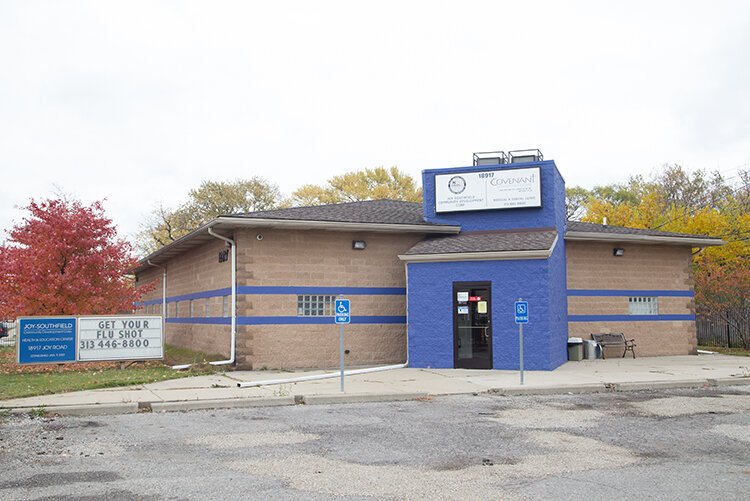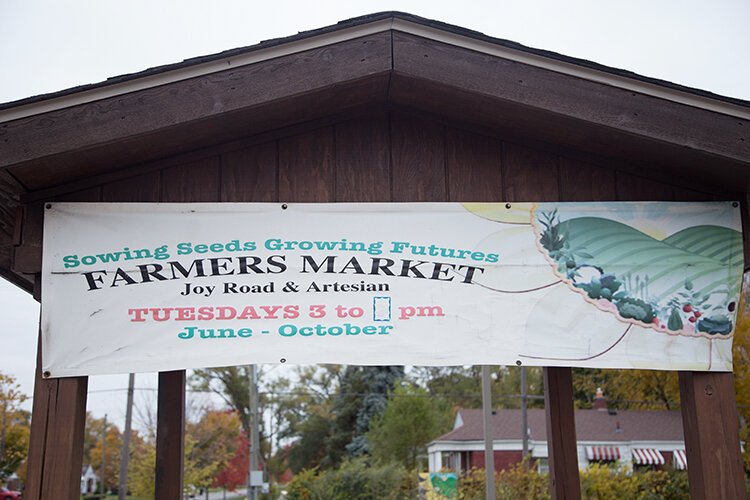Crystal Staffney talks about community health work on Detroit’s West Side
Model D: To begin, what can you tell us about your organization?
Crystal Staffney: Joy Southfield Community Development Corporation was established approximately 20 years ago. The organization was founded by Second Grace United Methodist Church in 2001. Joy Southfield CDC first operated as a mini  JSCDC HQ and CCC clinic clinic for those who were uninsured in Detroit’s 7th Ward. The mini-clinic provided health examinations and other preventive health care services such as vaccinations and immunizations. Over the past few years, we have improved our community health service and also moved into community economic development.
JSCDC HQ and CCC clinic clinic for those who were uninsured in Detroit’s 7th Ward. The mini-clinic provided health examinations and other preventive health care services such as vaccinations and immunizations. Over the past few years, we have improved our community health service and also moved into community economic development.
Model D: I’ve heard that one of your big priorities right now is to address what’s called the social determinants of health. Could you explain what this means for our readers who may not have heard of this term before?.
CS: I would define it as the non-medical aspects that affect outcomes and health risks. So I think of the circumstances and the environment in which people are born, live, play and work. It involves a wide range of health and quality of life issues.
Model D: What are the major health issues in the community you serve?
CS: I would say, food security issues; not having many grocery stores in the area or having overpriced stores. Also the inability to be able to eat healthily because of financial resources. If you have $62 to your name and five kids, it’s going to be really hard to get a healthy meal when McDonalds sells 50 cent hamburgers.
Model D: What about the most important health issues that residents face?
CS: Diabetes, high blood pressure, heart and cardiovascular problems. And I believe [their prevalence] it’s because [residents] do not have access to healthy food or do not have the resources to buy it. And that’s one of the reasons we hold our farmers’ market because we have low-priced produce. Our goal is to try to support the community with at least the fruits and vegetables they need to live healthier.
Template D: Tell us about your farmers market.
CS: As part of our community health service, we have a farmers market, which is JSCDC Farmer’s Market called sowing more and more future seeds. We generally operate from late May or early June to October each year.
JSCDC Farmer’s Market called sowing more and more future seeds. We generally operate from late May or early June to October each year.
The market has been around for about 12 years. We secure and retain community vendors who sell fresh produce. We also have a small business community organization as part of our market. So this year, we will start on June 7th. That is to say every Tuesday from 3 p.m. to 6 p.m. In addition to our farmer’s market. We always work with Alliance Community Care. Our partnership was formed around 2012. We share space with the Covenant Community Care Clinic and they provide medical and dental services for the 7th Ward.
Model D: What other health-related programs do you offer?
CS: We have our Cooking For Change program. [it’s] led by our community chef who offers weekly healthy cooking demonstrations to our residents during the Farmer’s Market. Our chef plans, sources and prepares nutritionally sound food. He also provides different training on cooking techniques and food preparation at our Farmer’s Market. After our farmer’s market is complete, our leader travels to the community to implement evidence-based programs for our residents. This includes recipes, instructions, and also locating inexpensive ingredients to fit their budget.
[We also have] our healthy prescribing program which is a partnership with Covenant Community Care. We support patients who suffer from chronic diseases such as diabetes and congestive heart failure. We help them develop a plan and diet that will help them with their medical issues. Through this partnership, we provide Covenant Carte patients with healthy fruits and vegetables in food boxes. They have to get a doctor’s prescription, and then they come to us and we help them develop this regimen, meeting with them weekly to make sure they stay on track to achieve their goals.
And finally, we have our HEAL support group. It represents health, food, activity and learning. The support group is focused on diabetes at this time. My goal is to eventually add [residents dealing with] heart and cardiovascular disease to this program. We support people living with a disease with resource information, weekly conversations with health experts, and different incentives through the program. So that’s the aspect of community health.
Now, in terms of our community economic development, we continue to develop things and improve our program. Currently, one of our major community economic development programs is our Healthy Homes Rx program. We work very diligently with some of our partners and funders to support our residents who are facing issues at home that affect their health, which can lead to asthma and other issues. In the past we have supported residents with mold issues, lead issues, roof repairs and different things like that. This year we are working on making more repairs. [There’s] an application process, and we have a ton of residents who need support. It’s first come, first served, depending on the resources we have at the time.
Model D: Anything else you would like our readers to know?
CS: One of the major projects we are working on is finding a building to buy and renovate. One of our future goals is to create a community hub for our residents and businesses. We want [operate] a space where you can come, if you need a meeting space. We also want to be the go-to place for businesses to learn how to create proposals or different things that will benefit their businesses in the future. And, beyond that, we are looking to create a community kitchen where community chefs can come and prepare their events.
Resilient Neighborhoods is a reporting and engagement series that examines how Detroit residents and community development organizations are working together to strengthen local neighborhoods. It is made possible thanks to funding from the Kresge Foundation.


Comments are closed.